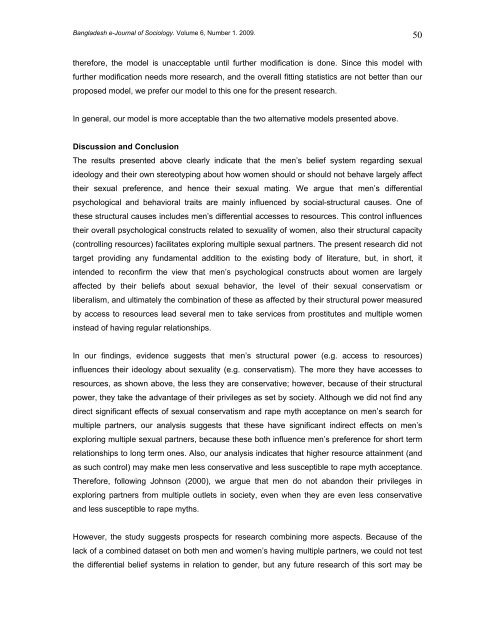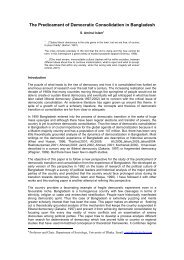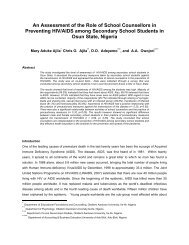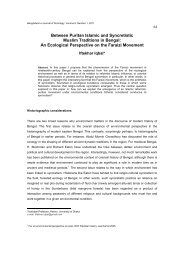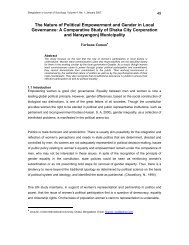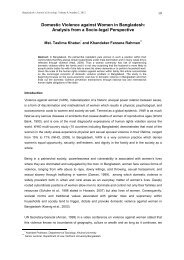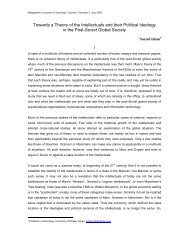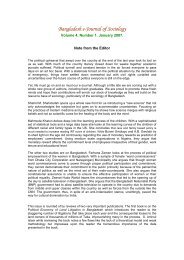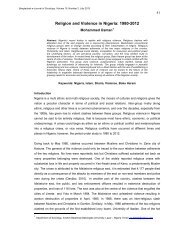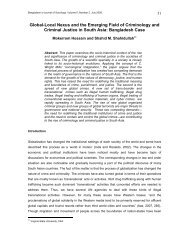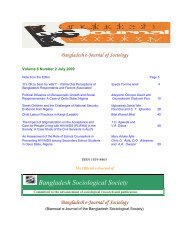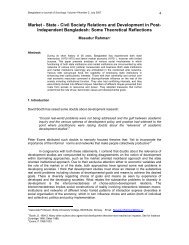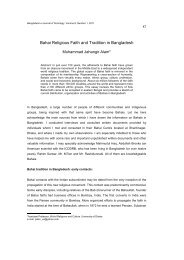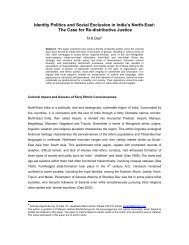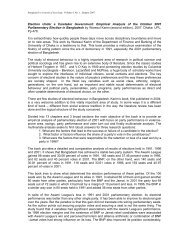Bangladesh e-Journal of Sociology - Bangladeshsociology.org
Bangladesh e-Journal of Sociology - Bangladeshsociology.org
Bangladesh e-Journal of Sociology - Bangladeshsociology.org
Create successful ePaper yourself
Turn your PDF publications into a flip-book with our unique Google optimized e-Paper software.
<strong>Bangladesh</strong> e-<strong>Journal</strong> <strong>of</strong> <strong>Sociology</strong>. Volume 6, Number 1. 2009.<br />
50<br />
therefore, the model is unacceptable until further modification is done. Since this model with<br />
further modification needs more research, and the overall fitting statistics are not better than our<br />
proposed model, we prefer our model to this one for the present research.<br />
In general, our model is more acceptable than the two alternative models presented above.<br />
Discussion and Conclusion<br />
The results presented above clearly indicate that the men’s belief system regarding sexual<br />
ideology and their own stereotyping about how women should or should not behave largely affect<br />
their sexual preference, and hence their sexual mating. We argue that men’s differential<br />
psychological and behavioral traits are mainly influenced by social-structural causes. One <strong>of</strong><br />
these structural causes includes men’s differential accesses to resources. This control influences<br />
their overall psychological constructs related to sexuality <strong>of</strong> women, also their structural capacity<br />
(controlling resources) facilitates exploring multiple sexual partners. The present research did not<br />
target providing any fundamental addition to the existing body <strong>of</strong> literature, but, in short, it<br />
intended to reconfirm the view that men’s psychological constructs about women are largely<br />
affected by their beliefs about sexual behavior, the level <strong>of</strong> their sexual conservatism or<br />
liberalism, and ultimately the combination <strong>of</strong> these as affected by their structural power measured<br />
by access to resources lead several men to take services from prostitutes and multiple women<br />
instead <strong>of</strong> having regular relationships.<br />
In our findings, evidence suggests that men’s structural power (e.g. access to resources)<br />
influences their ideology about sexuality (e.g. conservatism). The more they have accesses to<br />
resources, as shown above, the less they are conservative; however, because <strong>of</strong> their structural<br />
power, they take the advantage <strong>of</strong> their privileges as set by society. Although we did not find any<br />
direct significant effects <strong>of</strong> sexual conservatism and rape myth acceptance on men’s search for<br />
multiple partners, our analysis suggests that these have significant indirect effects on men’s<br />
exploring multiple sexual partners, because these both influence men’s preference for short term<br />
relationships to long term ones. Also, our analysis indicates that higher resource attainment (and<br />
as such control) may make men less conservative and less susceptible to rape myth acceptance.<br />
Therefore, following Johnson (2000), we argue that men do not abandon their privileges in<br />
exploring partners from multiple outlets in society, even when they are even less conservative<br />
and less susceptible to rape myths.<br />
However, the study suggests prospects for research combining more aspects. Because <strong>of</strong> the<br />
lack <strong>of</strong> a combined dataset on both men and women’s having multiple partners, we could not test<br />
the differential belief systems in relation to gender, but any future research <strong>of</strong> this sort may be


